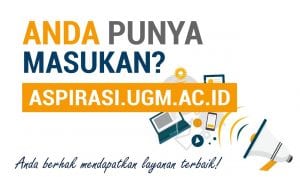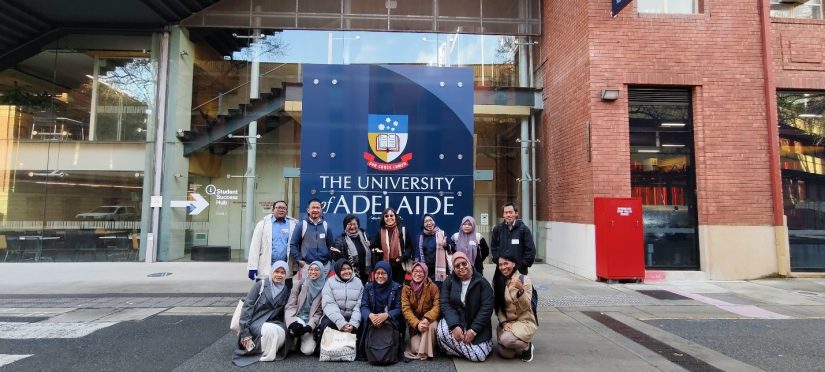
Two students of Study Program of Master’s in Biotechnology UGM, Nada Tazkia Purba and Nurmara Salsabila, along with Study Program of Biotechnology UGM’s lecturer Dr. Yekti Asih Purwestri and Dr. Tri Rini Nuringtyas attended a workshop at the University of Adelaide (UoA), Australia on June 18-21, 2024. This activity is one of the objectives of the KONEKSI (Knowledge Partnership Platform Australia-Indonesia) Program, a collaborative initiative between organizations in Australia and Indonesia. Together with the Australian Research Council (ARC) Training Center for Future Crops Development, Australian National University (ANU), the research collaboration entitled “Building a Sustainable Future: Developing Nutritious and Climate-Resilient Crop Varieties” also involves BRIN Indonesia and IRRI Philippines. On this trip, the KONEKSI research consortium was fully present, namely Dr. Aris Hairmansis, Dr. Yudhistira Nugraha, and Trias Sitaresmi, M.Sc. from BRIN; Prof. Inez Slamet-Loedin from IRRI; and Dr. Siti Nurbaiti, Dr. Yustina C.F.S., Gloria Fransisca K.L., and a team of research assistants from UGM.
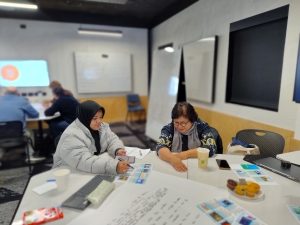
The workshop was the second annual meeting of the ARC Training Center For Future Crops Development, which was attended by all members of the industrial training center and KONEKSI research partners. During the activity, participants are encouraged to discuss research, training, and collaboration opportunities between participants. The workshop began with a presentation regarding the vision, research areas, and achievements of the ARC Training Center. The event continued with presentations from industry partners regarding the diversity of careers and working experiences in the fields of research and industry which emphasized aspects of Agrifood development in the future to encourage agricultural interests and global food security. Dr. Yekti Asih Purwestri, an Indonesian collaborator from KONEKSI, also presented ongoing forms of research collaboration.
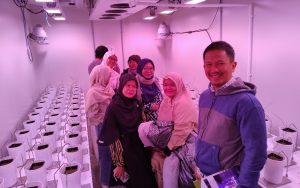
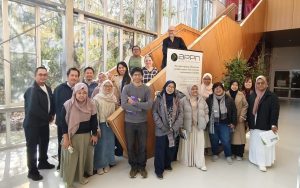
At the workshop, participants were also given the opportunity to build connections and network with each other, either through small group discussions, poster sessions, and activities at the museum. In the poster session, participants were able to discuss and exchange information regarding research developments based on the research themes raised in the posters presented by doctoral students and researchers from ANU and UoA. Communication between participants became increasingly warm while participating in activities with the theme “Broken” at the Museum of Discovery. This activity presents a demonstration of phenomena and problems in the world today, participants are not only presented with various information but are also invited to be involved in thinking about solutions to create a sustainable life.
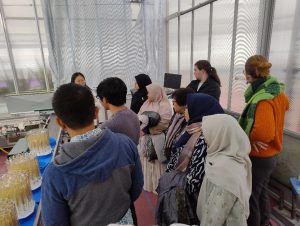
A visit to the University of Adelaide’s Waite Institute was the most memorable part of this trip. The visit began with a presentation from Plant For Space (P4S) which focused on research to grow plants in space as a sustainable food source as a new solution for space habitation and sustainable food availability on Earth. The visit continued with a lab tour, seeing firsthand the vertical farm aero cultivation that is being developed. In the same location there is the Australian Plant Phenomic Network (APPN) which provides machine learning system-based facilities for automatic analysis of plant characteristics. One of the facilities that can be used is high-throughput multispectral imaging which can capture three-dimensional (3D) views of plants with a wide wavelength range of light. A visit to APPN was the conclusion of a series of trips to Adelaide. This trip is expected to strengthen cooperation between the Study Program of Biotechnology UGM and ANU and increase the capacity and capability of students and lecturers of the Study Program of Biotechnology UGM.

